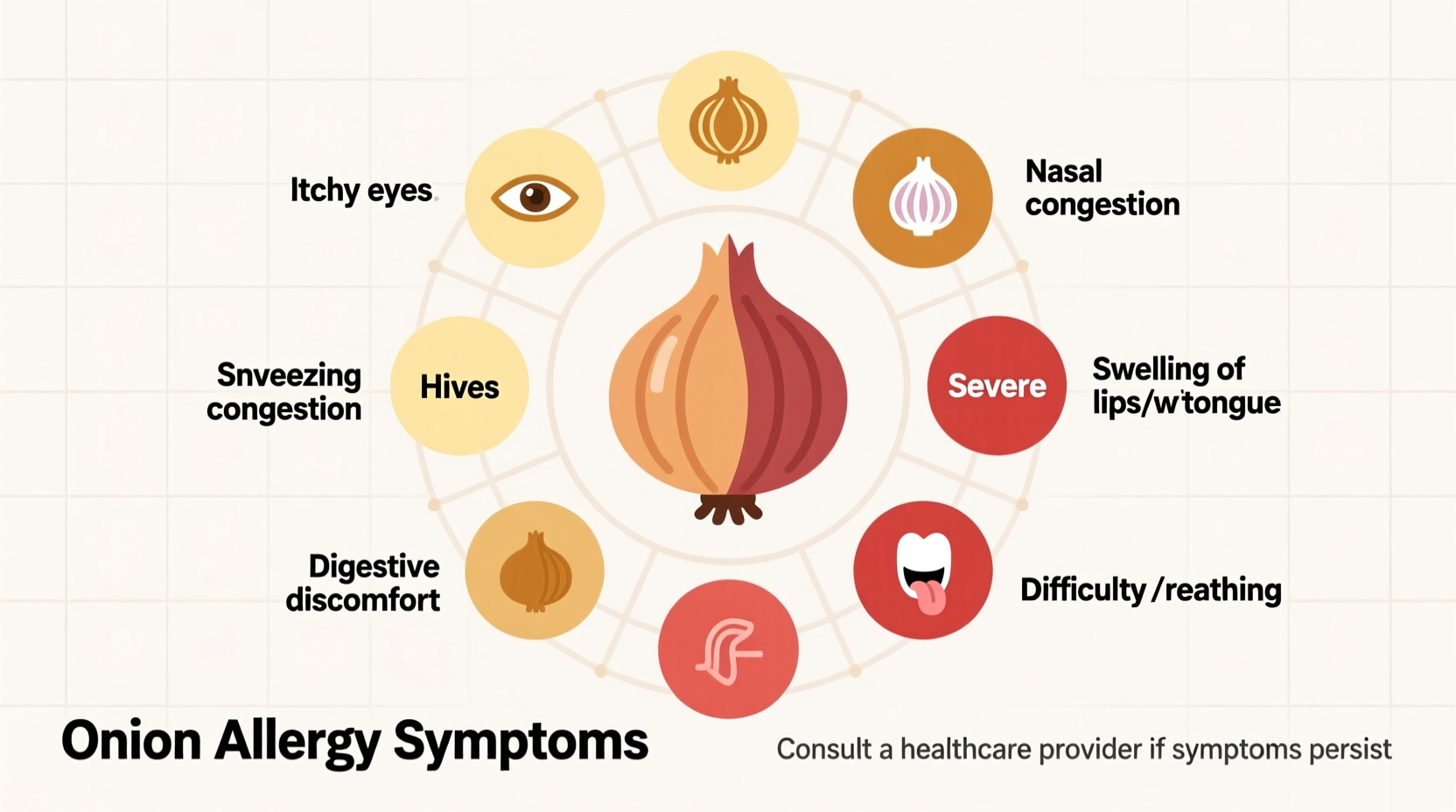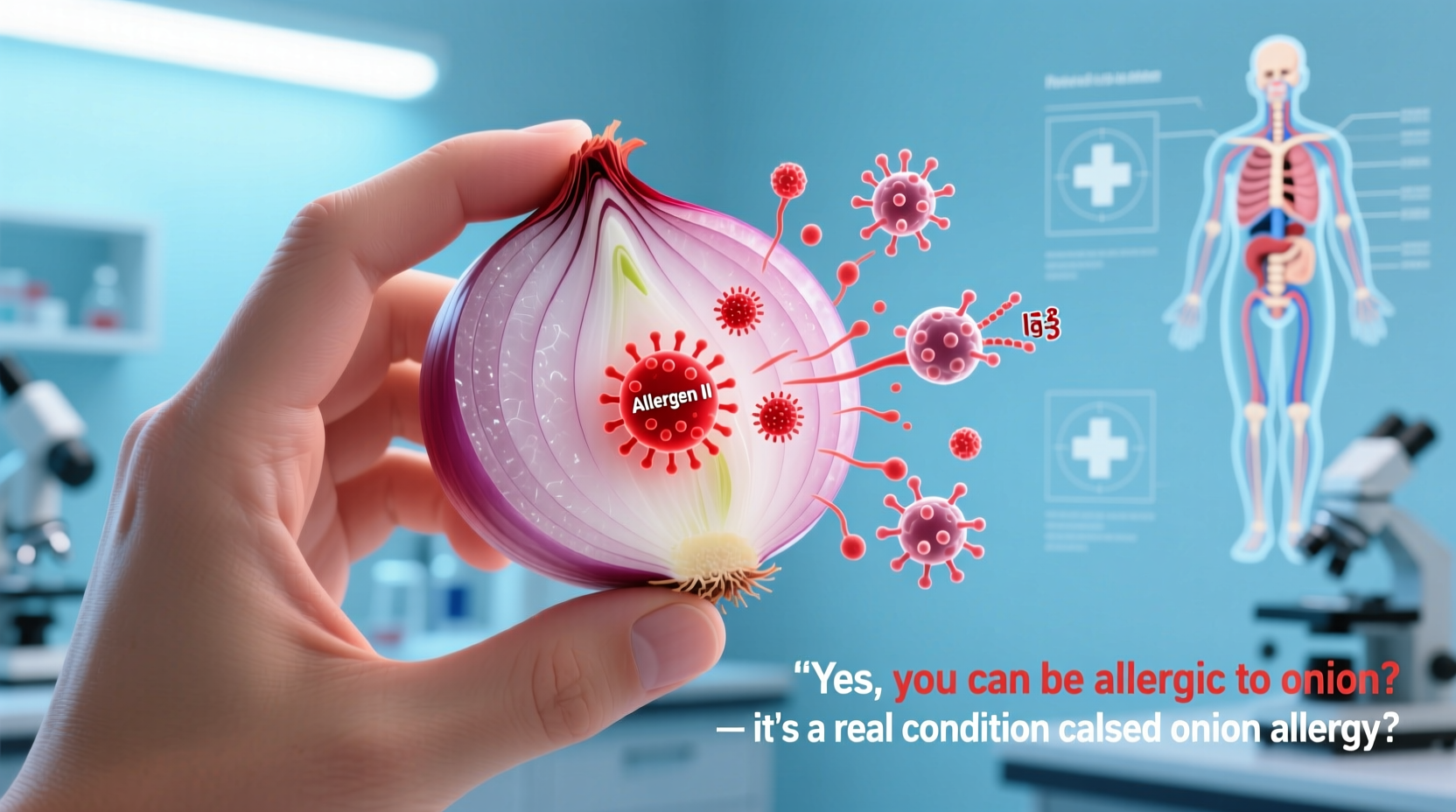Understanding Onion Allergy: More Than Just a Stomach Upset
When you search "can you be allergic to onion," you're likely experiencing puzzling symptoms after eating dishes with this common kitchen staple. Unlike simple digestive discomfort, a true onion allergy triggers your immune system to mistakenly identify onion proteins as harmful invaders. This distinction matters because misdiagnosing an allergy as mere intolerance could put you at risk during future exposures.
Spotting the Signs: Your Body's Red Flags
Onion allergy symptoms typically appear within minutes to two hours after consumption. Recognizing these warning signs helps you take appropriate action:
| Allergy Symptoms | Intolerance Symptoms | When They Appear |
|---|---|---|
| Hives or skin rash | Bloating or gas | Immediate (5-30 min) |
| Swelling of lips/face | Stomach cramps | Immediate (5-30 min) |
| Trouble breathing | Diarrhea | Immediate (5-30 min) |
| Anaphylaxis (rare) | Headaches | Delayed (hours later) |
This comparison comes from clinical observations documented by the American Academy of Allergy, Asthma & Immunology, highlighting why proper diagnosis matters. While intolerances cause digestive distress, allergies involve your immune system and can escalate rapidly.
How Common Is This Reaction? Setting the Record Straight
Despite onions being kitchen essentials worldwide, documented onion allergies remain relatively rare compared to top allergens like peanuts or shellfish. Research published in the Journal of Allergy and Clinical Immunology indicates onion allergy affects approximately 0.5-1.5% of the general population, with higher prevalence among:
- Adults over 30 (unlike many childhood allergies)
- Individuals with existing pollen allergies
- People with latex sensitivity
- Those with other Allium family allergies (garlic, leeks)
The National Institutes of Health notes that onion allergy often develops unexpectedly in adulthood, unlike many food allergies that appear in childhood. This explains why you might suddenly react to onions after years of safe consumption.
Getting the Right Diagnosis: Don't Guess, Test
Self-diagnosing "can you be allergic to onion" based on symptoms alone risks either unnecessary dietary restrictions or dangerous exposure. Proper diagnosis involves:
- Medical history review: Your allergist will examine your symptom patterns and family allergy history
- Skin prick test: Small amounts of onion extract applied to your skin to check for reactions
- Blood test (sIgE): Measures specific antibodies to onion proteins
- Oral food challenge: Supervised consumption of onion under medical observation (gold standard)
According to the American College of Allergy, Asthma, and Immunology, up to 30% of suspected onion allergies turn out to be intolerances or reactions to other ingredients when properly tested. This is why professional evaluation beats internet research alone.

Managing Your Onion Allergy: Practical Daily Strategies
Once diagnosed, effective management becomes your priority. Unlike some allergies with clear avoidance paths, onions hide in countless prepared foods. Your action plan should include:
Reading Labels Like a Pro
Onions appear under various names in ingredient lists:
- Dehydrated onions
- Onion powder
- Scallions or green onions
- Shallots
- Leek derivatives
Dining Out Safely
Restaurant meals pose significant risks. Always:
- Ask about broth bases (often onion-based)
- Request sauces on the side
- Specify "no onion in any form" to kitchen staff
- Carry emergency medication if prescribed
Smart Substitutions
Replace onion flavor safely with:
- Asafoetida (hing) for savory dishes
- Carrot and celery blends
- Roasted garlic (if not cross-reactive)
- Herb-infused oils
When to Seek Immediate Help: Critical Boundaries
Understanding the difference between manageable symptoms and emergency situations could save your life. Seek immediate medical attention if you experience:
- Difficulty breathing or wheezing
- Swelling of throat or tongue
- Dizziness or rapid heartbeat
- Multiple body systems affected (skin + digestive + respiratory)
The FDA's food allergy guidelines emphasize that anaphylaxis requires epinephrine administration within minutes, not antihistamines alone. If your allergist has prescribed an epinephrine auto-injector, carry it at all times and know how to use it.
Living Well Long-Term: Beyond Basic Avoidance
Successfully managing onion allergy involves more than just avoidance. Consider these often-overlooked aspects:
- Nutritional balance: Onions provide chromium and vitamin C - discuss supplementation with your dietitian
- Cross-reactivity: 40-60% of onion-allergic individuals react to garlic (per NIH research)
- Hidden exposures: Check non-food products like cosmetics and medications
- Seasonal variations: Some experience worse reactions during pollen season
Regular follow-ups with your allergist help track whether your sensitivity changes over time. Many adults find their onion allergy remains stable rather than outgrowing it like some childhood allergies.
Frequently Asked Questions About Onion Allergy
Can you suddenly develop an onion allergy as an adult?
Yes, adult-onset onion allergy is well-documented. Unlike many childhood allergies, onion allergy frequently develops unexpectedly after years of safe consumption, typically between ages 30-50 according to clinical studies from the American Academy of Allergy, Asthma & Immunology.
Is onion intolerance the same as onion allergy?
No, they're fundamentally different. Onion allergy involves your immune system producing IgE antibodies, potentially causing life-threatening reactions. Intolerance affects digestion only, causing discomfort like bloating without immune system involvement. Proper diagnosis is crucial for appropriate management.
Can cooking onions reduce allergic reactions?
No, unlike some food proteins that break down with heat, onion allergens (particularly All c 3 and All c 4 proteins) remain stable during cooking. Both raw and cooked onions can trigger reactions in sensitive individuals, according to research published in Clinical and Experimental Allergy.
Are there reliable home tests for onion allergy?
No, home tests cannot reliably diagnose onion allergy. Skin prick tests and blood tests performed by board-certified allergists remain the gold standard. The American College of Allergy, Asthma, and Immunology warns against unverified testing methods that often produce false positives or negatives.
Can onion allergy be outgrown?
Unlike common childhood allergies (milk, egg), onion allergy rarely resolves spontaneously. Most adults diagnosed with onion allergy manage it as a long-term condition. Regular follow-ups with your allergist can monitor any changes in sensitivity through controlled testing.











 浙公网安备
33010002000092号
浙公网安备
33010002000092号 浙B2-20120091-4
浙B2-20120091-4